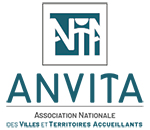CHARTER OF THE NATIONAL ASSOCIATION OF WELCOMING CITIES AND TERRITORIES
Download the ANVITA Charter in PDF version here.
The crisis of the reception of migrants is above all a crisis of values undermined by national and European policies preventing, at all costs, the arrival in Europe of people who have fled their country.
These arrivals are, however, unavoidable because of conflicts, poverty and climate change. They are inherent to the right to mobility.
The migration policy established both at the European level and at the level of the Member States and the lack of consensus between the States of the Union lead to the violation of fundamental rights and to a lack of European solidarity, both between Member States and towards those who are fleeing dramatic living conditions.
In France, as many associations and the National Consultative Commission on Human Rights (CNCDH) have pointed out, the fundamental rights of migrants continue to be restricted. The struggle of associations to assert these rights is a blatant example, as are the positions taken by the Human Rights Defender.
This policy of closure and inward-looking attitudes is now fuelling mistrust, multiplying political risks, destabilizing public opinion and weakening France's position in Europe and in the world.
In spite of this reality, optimism of will endures.
This is what drives us, as elected officials, citizens, volunteers, activists or political leaders. This fraternity is the honor of France. It strengthens the foundations of an inclusive society.
In France, we are the custodians of humanist values and of a historical tradition of welcoming people, which is now under threat. We refuse any policy that calls into question unconditional reception, hinders fundamental freedoms and constitutes a form of institutional violence.
When the State, within the framework of its competences, organizes reception in a territory in connection with the community and civil society, experience proves that inclusion is possible and enriching.
On the other hand, when the State is failing, the municipalities and the territories are left alone with the associations and the citizens, in the front line to face the humanitarian emergency. It is up to us, in our territories, both to act in the image of the history and culture of hospitality in France and to call on the State to assume its responsibilities. For our part, this is what we are already doing in our cities with our solidarity policies. On the basis of our experiences, we are making proposals adapted to respond to the imperatives of the emergency and the inclusion of all people in an unconditional manner.
1. We propose, beyond the hospitality of the cities, the recognition of this temporary presence, called transit. This would make it possible to "secure" migratory routes, to offer the necessary time to reflect on the migratory project, giving each person the possibility to pursue it, to amend it or to give it up. For this to happen, the government must finally respect the fundamental rights of migrants and abandon its reductive vision of migratory phenomena, which consists in opposing asylum seekers to other migrants, and migrants to the French.
2. Our territories can become refuges for all those who need to be sheltered. It is to implement the duty of hospitality by responding first and foremost to emergencies, those related to unconditional access to accommodation, food, hygiene, health, education and culture to meet vital needs.
3.We propose to implement any mechanism that allows people, whatever their status, to live with dignity in our territories, in accordance with the Amsterdam Pact of May 2016 and the UN Habitat III Convention of October 2016
4. We demand the respect of the rights of unaccompanied minors and young adults when the departmental councils and the State fail to take care of them. The principle of taking into account the interests of the child must take precedence over any other consideration. These rights are guaranteed by the 1989 International Convention on the Rights of the Child and in accordance with the Code of Social Action and Families and the application circulars (May 2013 and January 2016). If this competence falls within the competence of the departments, the State must provide the financial means necessary for dignified care and quality support throughout the territory.
5. We demand that the State assumes its missions and provides the means to create more and better reception, accommodation and support solutions than those existing today. France can, if we collectively decide to do so, prevent migrants from being forced to live in camps, shanty towns or "jungles", thanks to a welcome worthy of our humanity. The implementation of a real interministerial reception policy, under the aegis of the Prime Minister, would put an end to the improvised and contradictory measures taken by the Ministry of the Interior alone. The association will be the interlocutor of the reception and integration agency that we would also like to see emerge at the national level.
To do this, it will be necessary to formalize this network at the national level and to open a permanent and constructive dialogue with all the actors of civil society and the State, in order to find concrete and pragmatic solutions within the framework of a welcoming country, more tolerant and open to the world.
There is no such thing as a national solution to reception, but as many solutions as there are local situations.
Find out more about ANVITA's protection policy for vulnerable people here (in french).
